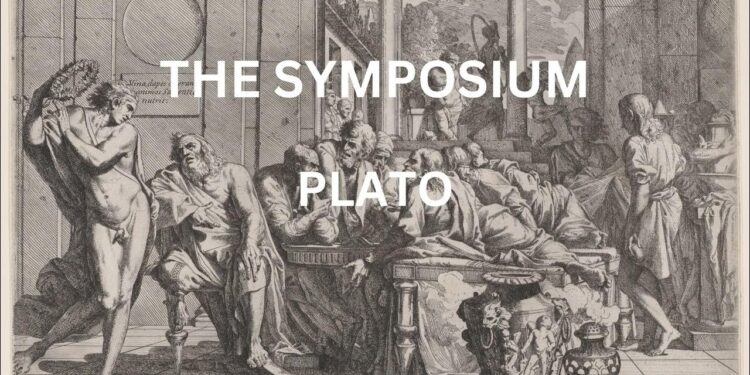Introduction to Plato’s Symposium
The Symposium by Plato Plot Summary And Thems is one of his most famous and thought-provoking dialogues, composed around 385–370 BCE. The dialogue centers around a drinking party (or symposium) attended by a group of intellectuals and prominent figures from Athenian society. They gather to celebrate the victory of the playwright Agathon at the Lenaia Festival and, as is customary in such gatherings, the conversation turns to a discussion of love (or Eros).
What makes Symposium particularly unique is that it is structured as a series of speeches given by the participants, each offering a different perspective on the nature of love, its purpose, and its role in human existence. As the dialogue progresses, we hear from several characters, including Phaedrus, Pausanias, Aristophanes, Eryximachus, Agathon, Socrates, and Alcibiades. These speeches build on one another, with each speaker contributing a different dimension of understanding about love, leading to Socrates’ final and most philosophical speech, which reshapes the entire conversation and provides the dialogue’s most profound insights.
Read More
The dialogue is often seen as both a celebration and a philosophical investigation into the concept of Eros, moving from the earthly and physical aspects of love to its highest, most intellectual form—philosophical love. Through the speeches, Plato addresses themes such as the nature of beauty, the relationship between love and virtue, the concept of platonic love, and the importance of philosophical knowledge in transcending mere physical attraction.
Plot Summary of Plato’s Symposium
Setting the Stage: The Drinking Party
The dialogue begins with Apollodorus, a follower of Socrates, recounting the events of the symposium to an unnamed friend. Apollodorus mentions that the conversation that took place was centered on the question of love, and that Socrates played a key role in the discussion. The setting for the dialogue is a banquet held in the house of the playwright Agathon, where a group of guests has gathered to celebrate his recent success.
At the party, the participants decide to engage in a drinking game where each person will give a speech in praise of Eros, the god of love. The speeches become the central content of the dialogue, with each participant offering their own understanding of the nature of love.
Phaedrus’ Speech: The Power of Love
The first speaker is Phaedrus, who argues that love is the greatest of all gods and that it is love that inspires men to perform the most heroic deeds. Phaedrus begins by describing how love’s power is demonstrated in various forms, particularly in its ability to motivate individuals to sacrifice for one another. According to Phaedrus, lovers would willingly die for each other, showing that love is the highest virtue. He also recounts examples from myth, such as Achilles’ devotion to Patroclus and the actions of various heroes, to emphasize the honor and courage that love can inspire.
Phaedrus is deeply influenced by the belief that love is the driving force behind noble deeds and heroism, and he stresses that the lover’s courage comes from the fear of shame in front of their beloved. As the speech progresses, the theme of self-sacrifice in love is introduced, with Phaedrus portraying love as a divine force that elevates human actions to the highest moral standards.
Pausanias’ Speech: The Dual Nature of Love
The next speaker, Pausanias, offers a more nuanced view of love, distinguishing between two types of love: Common Love and Heavenly Love. Pausanias explains that Common Love is the physical and lustful attraction that focuses only on beauty, while Heavenly Love is a deeper, intellectual connection, often associated with a love between an older man and a younger man (a practice common in ancient Greece), which involves mutual respect and the cultivation of virtue.
Pausanias argues that Heavenly Love transcends the physical body and focuses on the soul, aiming to foster wisdom, self-control, and virtuous behavior. In contrast, Common Love is superficial and can be driven by base desires. Pausanias’ speech highlights the philosophical idea that love is not merely a carnal pursuit but can lead to the cultivation of virtue and intellectual growth.
Eryximachus’ Speech: Love in the Context of Medicine and Science
The next speaker, Eryximachus, a physician, offers an even more scientific and medical explanation of love. He believes that love is a force that operates in all aspects of the universe, not just in human relationships. Drawing from his medical expertise, Eryximachus describes how love exists as a harmony or balance between opposing forces, both within the human body and in nature at large. He argues that love can bring about harmony in the body, preventing disease and promoting health, and that it also operates in the physical and cosmic worlds, from the seasons to the stars.
Eryximachus’ speech departs from the more personal and emotional aspects of love, presenting it as an overarching principle of balance and order that governs not only human relationships but the entire universe. This cosmological view of love suggests that it is a force that governs both the microcosm (the human body) and the macrocosm (the universe).

Aristophanes’ Speech: The Myth of the Androgynous Soul
Next, Aristophanes, the comic playwright, offers a humorous but deeply insightful speech that introduces the famous myth of the Androgynous Soul. He tells a story about how humans were originally spherical beings with four arms, four legs, and a single head with two faces. These beings were originally whole, self-sufficient, and complete. However, they were split in half by the gods, leaving humans with a deep yearning for their lost halves. According to Aristophanes, this yearning is what we call love.
Aristophanes’ myth serves as a metaphor for human longing and the quest for completeness. Love, in this view, is the desire to reunite with one’s other half, the lost part of the self. The myth emphasizes the idea that love is rooted in a need for wholeness and that it motivates individuals to seek out their “soulmate,” someone who complements and completes them.
Agathon’s Speech: The Beauty of Love
Agathon, the host of the symposium, follows with his speech, which praises Eros as a young and beautiful god, full of virtue and grace. Agathon describes love as the source of all that is noble and virtuous in human life. He argues that love is the youngest and most beautiful of the gods and that it is the cause of all virtue, including courage, justice, and wisdom. Agathon’s speech is full of rhetorical flourishes, emphasizing the beauty and power of love, but it is also somewhat superficial and less intellectually rigorous than the previous speeches.
Agathon’s speech provides a contrast to the more philosophical accounts of love offered by the other speakers, and it sets the stage for Socrates, whose speech will critique and reshape the entire conversation.
Read More
Socrates’ Speech: The Philosophy of Love
Finally, Socrates takes the floor, and his speech is the most profound and philosophical of all. Socrates begins by acknowledging that Agathon has praised love, but he shifts the conversation to a more intellectual level, drawing on the teachings of his mentor, the philosopher Diotima. According to Diotima, love is not merely the attraction to physical beauty or the search for a soulmate, as Aristophanes and Agathon suggested, but a ladder of ascent that leads to the love of the Good and the Beautiful itself.
Socrates introduces the concept of Platonic love, where love begins with the physical attraction to beautiful bodies but gradually progresses to a love for the beauty of souls, then the beauty of minds, and eventually culminates in the love of pure and immortal beauty—an abstract, philosophical form of beauty that transcends the material world. For Socrates, true love is not the pursuit of personal satisfaction but the pursuit of truth and wisdom, and it is through this philosophical ascent that one reaches the highest form of love, which is the love of the Form of Beauty itself.
Socrates’ speech reveals that love is not a simple or personal matter, but a philosophical journey that leads the lover to seek wisdom and knowledge. The true lover, Socrates concludes, is one who loves not for selfish reasons but for the sake of understanding the divine and eternal truths.
Alcibiades’ Speech: The Temptation of Socratic Love
The final speech is delivered by Alcibiades, a handsome and charismatic young man who arrives at the symposium drunk. He praises Socrates for his extraordinary qualities, describing how Socrates’ charm and wisdom have led him to fall in love with Socrates himself. Alcibiades contrasts Socrates’ intellectual beauty with his physical unattractiveness, making it clear that the love of the soul is more important than the love of the body.
Alcibiades’ speech underscores the theme of platonic love, where love transcends physical attraction and is rooted in a higher intellectual and philosophical connection.

















